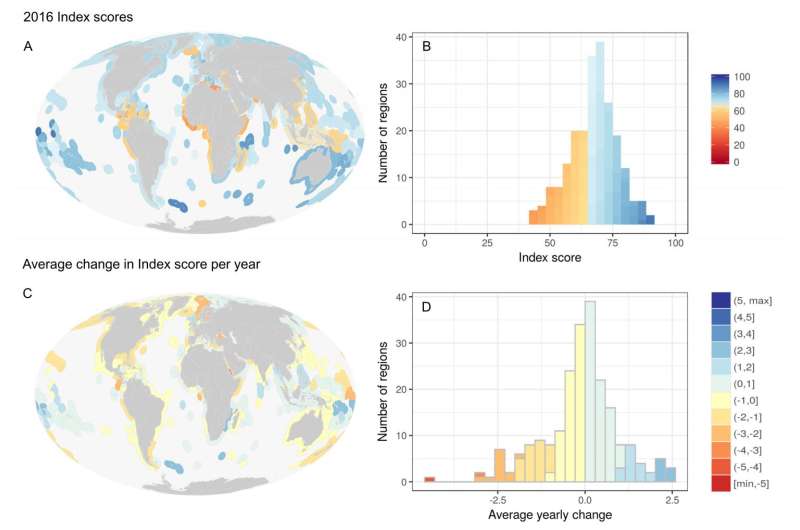Global ocean health relatively stable over past five years

While global ocean health has remained relatively stable over the past five years, individual countries have seen changes, according to a study published July 5, 2017 in the open-access journal PLOS ONE by Benjamin Halpern from University of California Santa Barbara, USA and colleagues.
The Ocean Health Index has been used to assess ocean health on the local and regional scale, measuring factors such as biodiversity, coastal protection, and clean waters to help inform regional policies. In this study, Halpern and colleagues analyzed five years' worth of Ocean Health Index data for 220 countries, seeking potential drivers and implications for the changes that they observed.
As expected, global ocean health has been fairly stable over the past five years, since the health of the world's oceans cannot change rapidly over a relatively short time period. However, there were notable changes in individual countries. For example, the authors found declines in overall ocean health in many Arctic and sub-Arctic countries, possibly because the rapid loss of sea ice has resulted in reduced coastal protection. The researchers suggest that improvements in wild-caught fishery management, the creation of marine protected areas, and decreases in harvesting of fish and other natural products may have stabilized ocean health scores in other regions.
While the Ocean Health Index was capable of predicting short term changes in global ocean health, the authors suggest that investment in additional resources for measuring changes on a global scale would greatly help with management and protection of ocean health now and in the future.
"One of the things that's so powerful about the Ocean Health Index is that it allows you to compare the health of oceans any place on the planet, over time, with a directly comparable measure," says Benjamin Halpern. "You can ask some of the most basic yet most important questions about the state of our planet: how are the oceans doing, and what factors are driving changes in ocean health. We can finally start answering those questions."
More information: Halpern BS, Frazier M, Afflerbach J, O'Hara C, Katona S, Stewart Lowndes JS, et al. (2017) Drivers and implications of change in global ocean health over the past five years. PLoS ONE 12(7): e0178267. doi.org/10.1371/journal.pone.0178267
Journal information: PLoS ONE
Provided by Public Library of Science





















